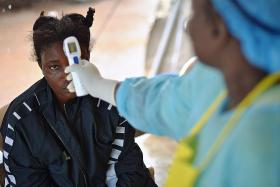Four tested in Singapore for Ebola and given all clear
As the scourge of Ebola spreads, sending some in the US into a state of panic, health care workers here are readying themselves for the possibility of the virus hitting Singapore.
In the last three months, there were four suspected cases of Ebola infection here, Professor Leo Yee Sin, the clinical director at the Communicable Disease Centre (CDC), said in an exclusive interview with The New Paper.
All four patients were negative for the virus and given the all-clear.
Prof Leo said the detection of the four suspected cases shows Singapore and its health care workers are battle-ready.
One of the suspected cases came from a public hospital and the other from a private one. The other two were from general practitioners, she said.
All were redirected to the CDC at Tan Tock Seng Hospital (TTSH) and tested negative.
"Outbreak management and the ability to handle infection of a big scale is not something new to many of the health care staff at TTSH and the CDC.
"We have a very mature checking system, developed from lessons learnt during (the outbreak of) severe acute respiratory syndrome (Sars)," said Prof Leo, who is also the director of the Institute of Infectious Diseases and Epidemiology at TTSH.
"For instance, at the Accident and Emergency Department, staff members would assess patients thoroughly before allowing them into the patient care area.
"(Their) temperature will be taken and questions asked include whether they have visited affected countries. If they fulfil the criteria, they are immediately segregated," she said.
SARS
Eleven years ago, Singapore was gripped by the Sars outbreak. There were 238 people infected and 33 died from it.
Prof Leo said while the world looked towards Singapore 11 years ago in the treatment of Sars, "we are now looking towards the world to learn the good practices, as well as the mistakes, in treating the Ebola epidemic", she said.
Ebola is a deadly viral disease transmitted through direct contact with the blood or bodily fluids of an infected person or though exposure to objects. It has taken more than 4,500 lives in seven countries, according to World Health Organization figures. The disease has no specific cure yet.
Calling it "a messy disease", Prof Leo said the virus affects the gut, causing patients to bleed, vomit and suffer from diarrhoea.
"The infected patient loses several kilogrammes from this. The massive output also contaminates the environment, and coming in contact with the contaminant is how the disease spreads. It has not been proven that it can be transmitted through the air," she said.
SAFETY FIRST
So managing the disease would mean safety first for the nursing and support staff.
"As patients will be losing water and electrolytes, we have to replace them. This puts the pressure on the nursing and support staff, who will be cleaning up the mess.
"I foresee that it will be challenging. But with tweaking of certain procedures already in place since Sars and ensuring the staff are protected in the right gear, I think we will be ready," Prof Leo said.
Awareness must also be created among the general population so there will be no irrational fear or misinformation.
"If you look at some of the reports, there is no documentation that the virus is spread while in an airplane and it is also unlikely to spread during the incubation period. Take the first case in Texas, for instance. There are many of his contacts under quarantine. None of them showed any signs of the infection," she said.
The risks are, therefore, at the health care setting so "we have to be sure to provide the right environment to ensure our health care workers are duly protected from getting infected".
"Fear is also not a bad thing, as it causes the protective mechanism to kick in. People become highly aware and will take necessary precaution," she said, adding categorically that there are currently no Ebola cases in Singapore.
"But in the event that we see one, I ask for the community's understanding that there is a need for safety and isolation to prevent the spread," Prof Leo said. "We have to put up with the inconvenience and trust that those at the CDC know what they are doing to make the country safe."
Meanwhile, screening stations have been set up at Changi Airport and health declaration cards will also be implemented at land and sea checkpoints, as well as at Seletar Airport.
Sars survivor ready to fight Ebola

READY: Ms Ashirdahwani Asmawi (in white) with her husband, their children, and her mother. PHOTO: MY PAPER FILE
She was the nurse managing Singapore's first Sars patient and her mother.
She may have caught the Sars bug and almost paid with her life, but she is ready to battle again if the Ebola virus lands here.
Tan Tock Seng Hospital's Senior Staff Nurse Ashirdahwani Asmawi told TNP that when Sars hit, no one knew what it was.
"We did not take the necessary precautions. There was no PPE (personal protective equipment) issued. Some of the nurses already had the symptoms, but they didn't know what it was," she said.
This time, Ms Ashirdahwani, 35, feels it is different.
"We are very much prepared for the onslaught... I don't think there will be panic as we will be better protected to deal with human excrement with additional protection on top of the PPE," said the clinical director.
During Sars, she was quarantined for almost a month.
For Ebola, Ms Ashirdahwani said they will have to put on two layers of gowns and gloves, "made from thicker material".
"We are also given a visor mask to protect our faces and boots to wear.".
It was a lonely month when she was a patient and isolated with hardly any human contact.
Speaking from a patient's point of view, she said: "All a patient needs is assurance. I also learnt never to say 'I know how you feel' to any patient.
"You don't know what they are going through until you are a patient undergoing the same infection yourself," she said.
Get The New Paper on your phone with the free TNP app. Download from the Apple App Store or Google Play Store now


